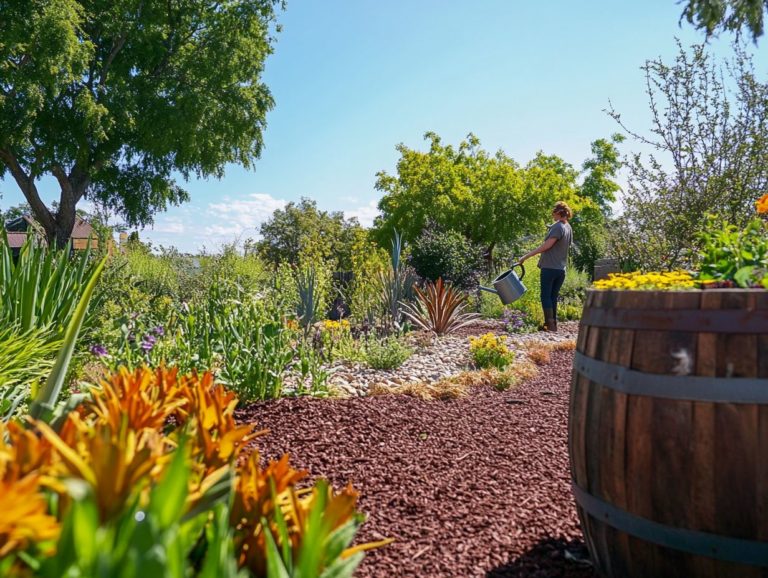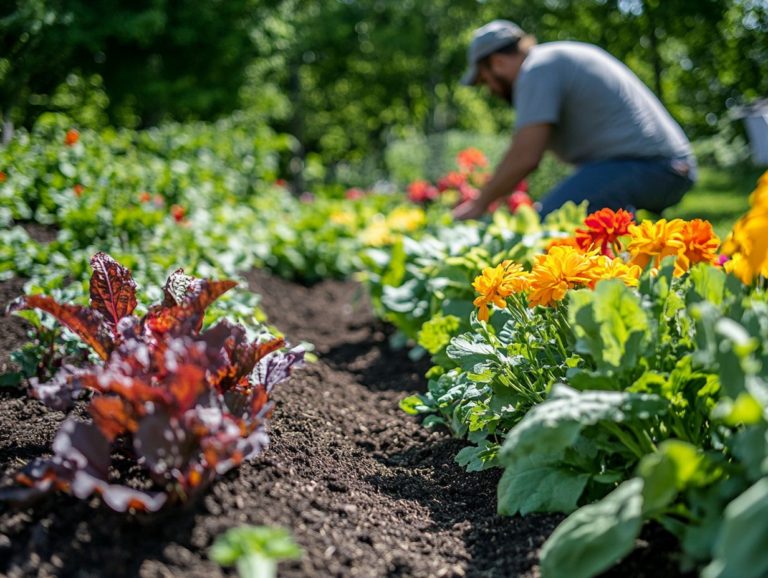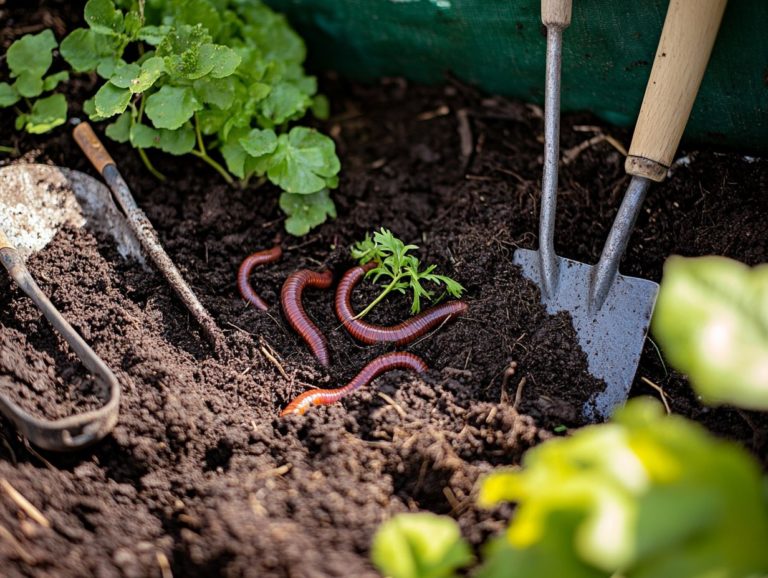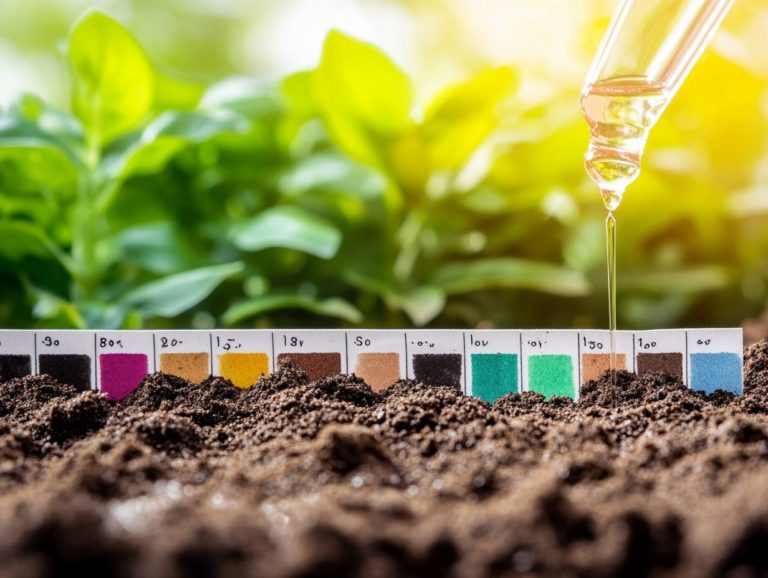The Role of Mycorrhizae in Soil Health
Mycorrhizae play a crucial role in enhancing soil health and promoting robust plant growth. These fascinating fungi form mutually beneficial partnerships with plant roots, unlocking essential nutrients while bolstering plants’ resilience against environmental stress.
This article delves into the definition and various types of mycorrhizae, including arbuscular mycorrhizae and ectomycorrhizae. It highlights their functions in soil and the significant benefits they offer for plant development. It also discusses the factors that influence their activity and offers practical ways for you to encourage mycorrhizal colonization in your garden or farm.
By understanding mycorrhizae, you enrich your knowledge of ecosystems and empower yourself to foster healthier, thriving plants.
Contents
Key Takeaways:
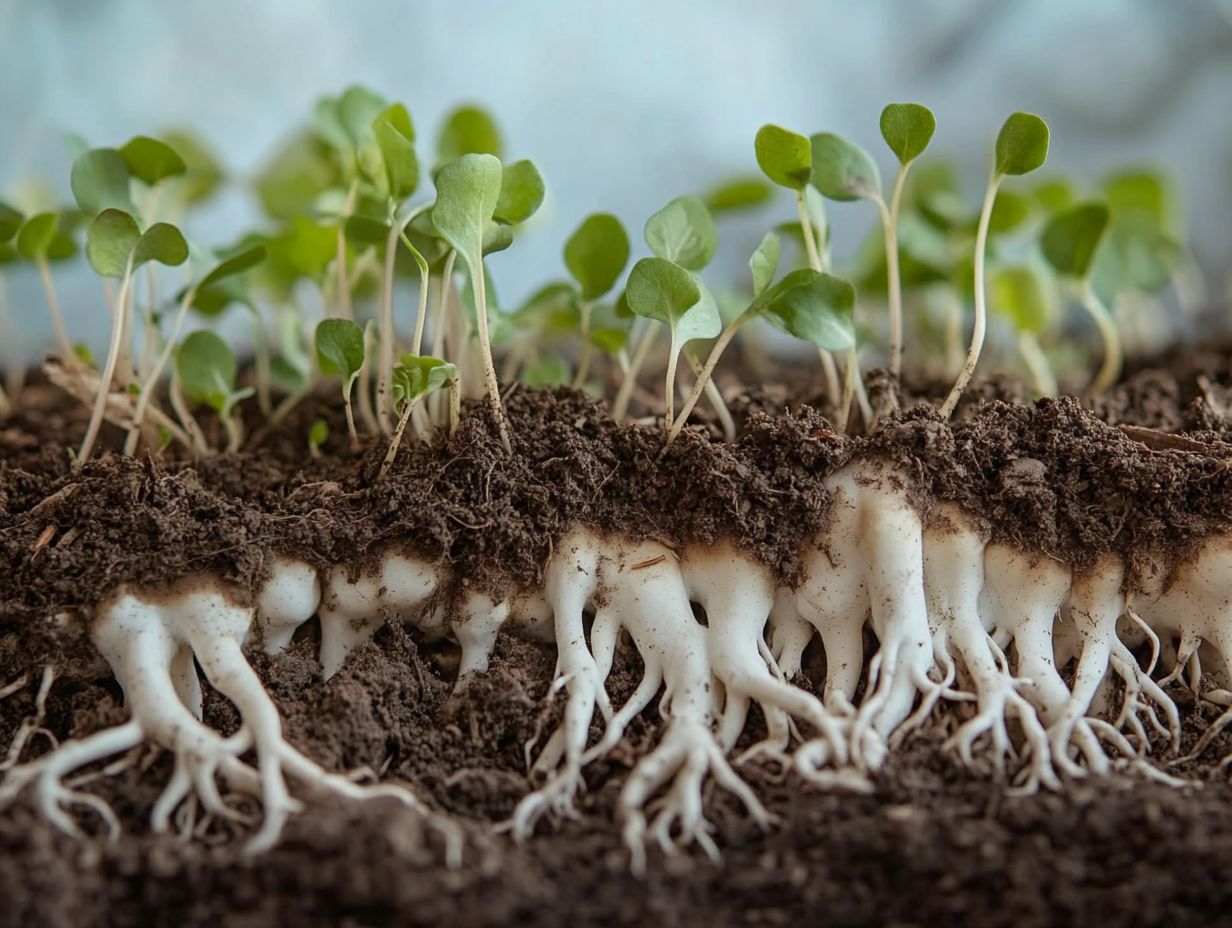
- Mycorrhizae play a vital role in soil health by improving nutrient absorption and stress tolerance for plants.
- Environmental and soil conditions greatly affect the activity of mycorrhizae, making it important to promote their growth through proper practices.
- Understanding the types and functions of mycorrhizae can help in creating healthier and more productive soil for plant growth.
Understanding Mycorrhizae
Mycorrhizae are specialized fungi that form a symbiotic relationship with plant roots. This enhances the plants’ ability to absorb nutrients and promotes overall health.
This intricate partnership is essential in ecosystems, enabling plants to flourish in organic-rich environments while facilitating the cycling of vital nutrients like nitrogen, phosphorus, and potassium.
The two primary types of mycorrhizae arbuscular mycorrhizae and ectomycorrhizae vary in their structures and functions. Yet both play a crucial role in bolstering plant health and soil vitality. Gaining a deeper understanding of mycorrhizae is essential for anyone interested in organic gardening and sustainable agriculture.
Functions of Mycorrhizae in Soil
Mycorrhizae play a vital role in soil health by boosting nutrient uptake and enhancing overall soil quality. These remarkable fungi expand the surface area of plant roots, enabling efficient absorption of crucial nutrients like nitrogen and phosphorus, which are frequently in short supply. Understanding the role of organic matter in soil health further emphasizes the importance of these interactions.
Mycorrhizae also play an important role in nutrient cycling, breaking down organic matter to release essential nutrients back into the ecosystem. This symbiotic relationship equips plants to better withstand environmental stresses, such as drought, thereby increasing their resilience in agricultural environments.
Nutrient Uptake and Protection
Mycorrhizae play a pivotal role in your garden’s success, enhancing nutrient uptake and providing protection for your plants. These remarkable fungi create an extensive network in the soil, acting as a conduit for essential nutrients while shielding your plants from soil pathogens.
This relationship not only boosts nutrient absorption but also fortifies plant health, offering a physical barrier against harmful organisms. As a result, your crops enjoy improved resilience and overall vitality, leading to healthier harvests and greater agricultural productivity.
By extending their hyphae, mycorrhizae significantly increase the surface area available for water and mineral absorption especially critical nutrients like phosphorus and nitrogen. These elements are vital for robust plant growth.
Furthermore, these beneficial fungi can secrete enzymes that break down organic matter, facilitating nutrient release even more. The protection they offer goes beyond mere physical barriers; certain mycorrhizal fungi produce compounds that can stimulate your plants’ defenses against pathogens, making them more resistant to disease.
In a sustainable agricultural approach, harnessing the benefits of mycorrhizae not only elevates your crop yields but also fosters long-term soil health, allowing you to reduce reliance on chemical fertilizers.
Benefits of Mycorrhizae for Plant Growth
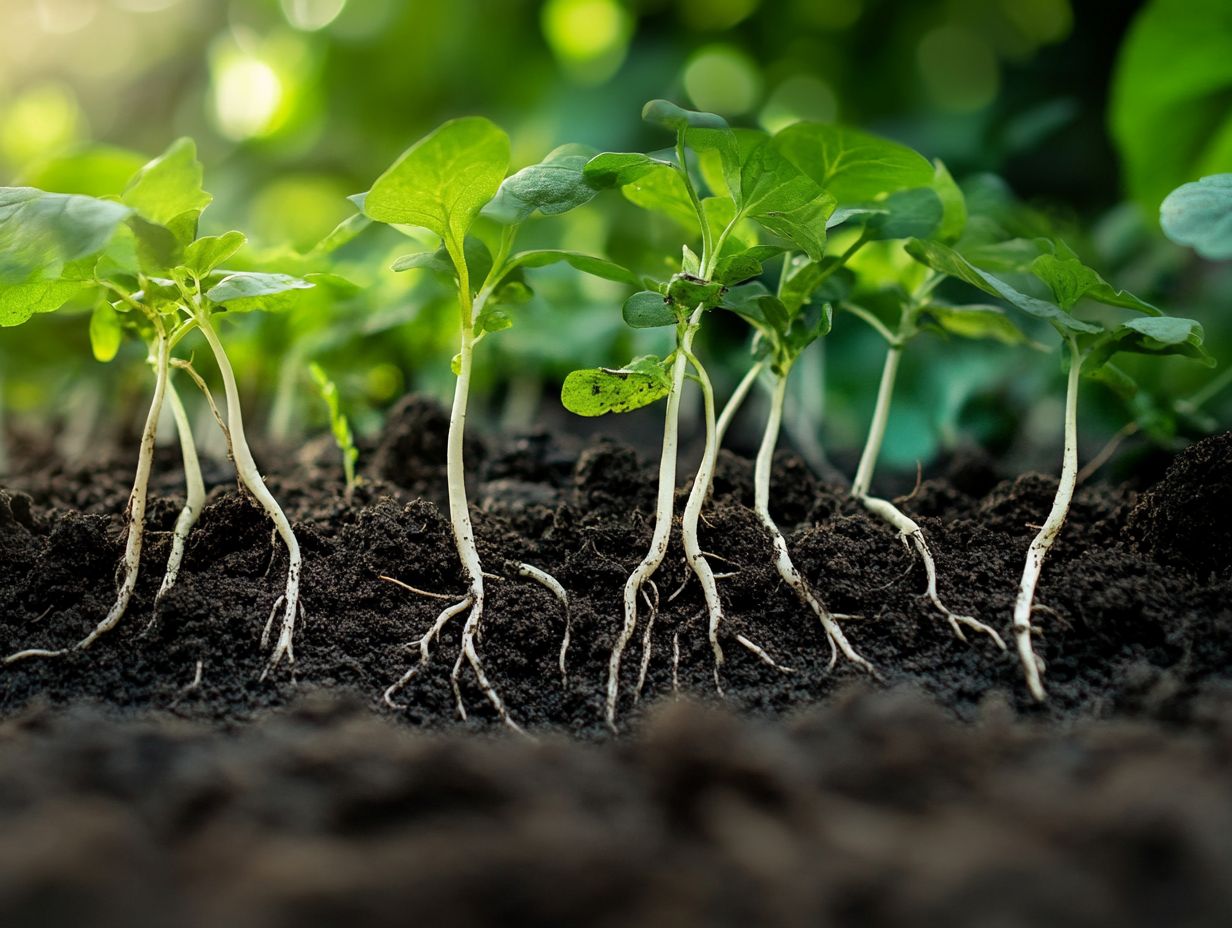
The benefits of mycorrhizae for plant growth are truly remarkable! They offer you enhanced nutrient availability and improved stress tolerance.
By forming a partnership with your plants, mycorrhizae significantly boost the efficiency of nutrient uptake. This makes essential soil nutrients readily accessible for plant use. These fungi also help your plants navigate various biotic and non-living challenges like drought and nutrient deficiencies ultimately elevating crop productivity across diverse agricultural systems.
Improved Nutrient Availability and Stress Tolerance
Improved nutrient availability and enhanced stress tolerance are two key benefits that mycorrhizae bring to plants. They enable plants to thrive even under challenging conditions.
By forming partnerships with plant roots, these beneficial fungi significantly boost the uptake of essential nutrients like phosphorus, nitrogen, and various micronutrients, which often fall short in the soil. For example, phosphorus crucial for energy transfer and photosynthesis becomes much more accessible through these mycorrhizal networks. Mycorrhizae also help plants withstand drought by improving water absorption and maintaining hydration.
This remarkable ability to efficiently harness soil resources allows crops not just to survive but to flourish, even in less-than-ideal environments. This resilience boosts agricultural productivity!
Factors Affecting Mycorrhizal Activity
Several factors intricately influence mycorrhizal activity, crucially affecting their capacity to enhance plant growth and soil health. The composition and structure of the soil including its organic matter content, moisture levels, and pH are pivotal in determining how effectively mycorrhizal fungi contribute to nutrient cycling.
Environmental conditions like temperature and the presence of specific plant species can either foster or impede mycorrhizal colonization. This underscores the delicate balance necessary for achieving optimal plant health within ecosystems.
Environmental and Soil Conditions
Environmental and soil conditions profoundly shape the activity and effectiveness of mycorrhizae in enhancing nutrient absorption. Elements like soil texture, moisture levels, and nutrient availability directly influence how mycorrhizal fungi establish associations with plant roots.
Climatic factors such as temperature and precipitation play a crucial role in determining the viability of these beneficial fungi. This ultimately impacts both plant health and agricultural productivity.
For example, sandy soils with excellent drainage may encourage quicker fungal colonization, while heavy clay soils can restrict root penetration and limit mycorrhizal development. High levels of soil compaction can obstruct water movement, diminishing fungal activity and subsequently hindering nutrient uptake.
In contrast, nutrient-rich environments, particularly those boasting optimal phosphorus levels, foster robust mycorrhizal interactions. These dynamics are essential, as elevated mycorrhizal activity enhances nutrient exchange, leading to healthier plants that display greater resilience against diseases and environmental stresses.
How to Promote Mycorrhizae in Soil
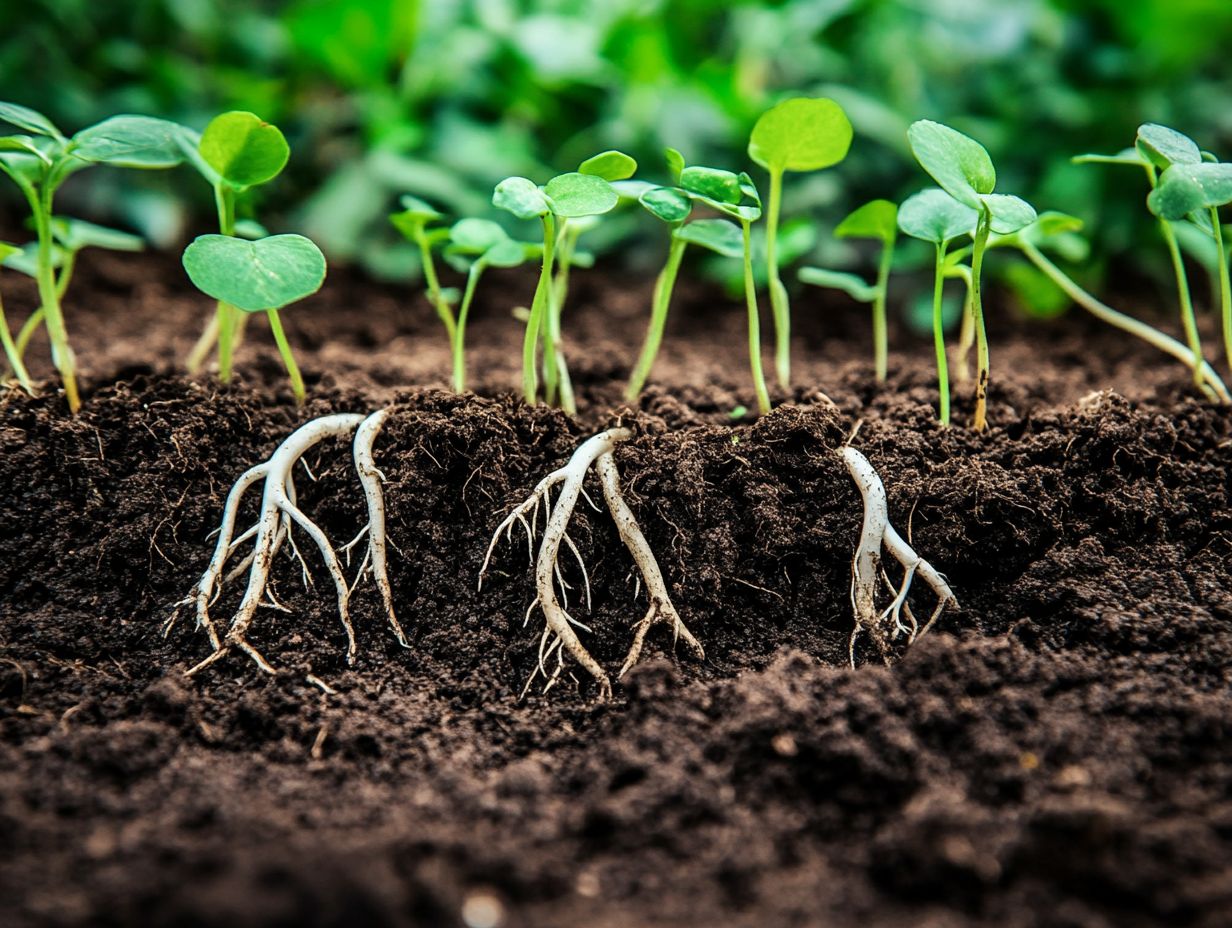
Promoting mycorrhizae in soil is crucial for enhancing plant health! There are several practices you can implement to achieve this.
One effective method is to utilize fungal inoculants, which introduce beneficial mycorrhizal fungi into your soil ecosystem. Incorporating organic matter, practicing crop rotation, and minimizing soil disturbance are also key strategies that can significantly boost mycorrhizal colonization.
These approaches not only support the health of mycorrhizae but also contribute to improved nutrient cycling and sustainable gardening practices.
Practices for Enhancing Mycorrhizal Colonization
To enhance mycorrhizal colonization in your soil, you can implement several best practices that greatly improve plant health and soil vitality.
Start by minimizing soil disturbance through no-till practices. Apply organic amendments to boost soil organic matter and plant diverse crops to encourage a variety of mycorrhizal associations.
By embracing these practices, you create an optimal environment for mycorrhizal fungi fungi that help plants absorb nutrients to thrive. This ultimately leads to enhanced nutrient cycling and healthier ecosystems.
Incorporating cover crops is another effective strategy. These crops protect your soil and contribute organic matter when tilled back in. Practicing crop rotation prevents the depletion of specific nutrients and fosters a balanced ecosystem.
You might also consider using compost teas, which add beneficial microbes that encourage mycorrhizal growth. Avoiding harmful chemical fertilizers allows natural microbial communities to flourish, promoting a rich and diverse soil microbiome.
Collectively, these strategies form a holistic approach to sustainable gardening, benefiting both your plants and the environment.
Why Mycorrhizae Matter for Thriving Soils and Plants!
The importance of mycorrhizae in soil health truly cannot be overstated. These fungi are fundamental players in nutrient cycling and enhancing plant vitality, highlighting the role of soil in our ecosystem.
Their intricate networks within the soil work wonders, improving nutrient availability and fostering a balanced ecosystem that supports lush plant growth.
Mycorrhizae enhance soil structure, increase water retention, and promote beneficial microbial activity. They significantly elevate overall soil vitality and agricultural productivity.
These remarkable fungi form symbiotic relationships with plant roots, allowing for the efficient uptake of essential nutrients like phosphorus and nitrogen crucial elements for robust plant development.
They also help break down organic matter, releasing locked nutrients back into the soil, thereby enhancing fertility. This symbiosis aids in nutrient absorption and bolsters resilience against soil pathogens, benefiting overall plant health.
As they interact with soil minerals and organic matter, mycorrhizae improve soil aeration and structure. They are invaluable allies in sustainable agricultural practices that aim to reduce chemical inputs while maximizing crop yields.
The Role of Mycorrhizae in Sustainable Agriculture
Mycorrhizae are game-changers in sustainable agriculture! They enhance nutrient absorption and elevate crop productivity while alleviating environmental stress.
By cultivating a symbiotic relationship with plant roots, these remarkable fungi allow you to tap into essential soil nutrients more efficiently. This is crucial for maximizing yields across various agricultural systems.
Mycorrhizae also contribute to soil health by fostering beneficial microbial activity and boosting organic matter content. This ultimately supports long-term agricultural sustainability.
Frequently Asked Questions
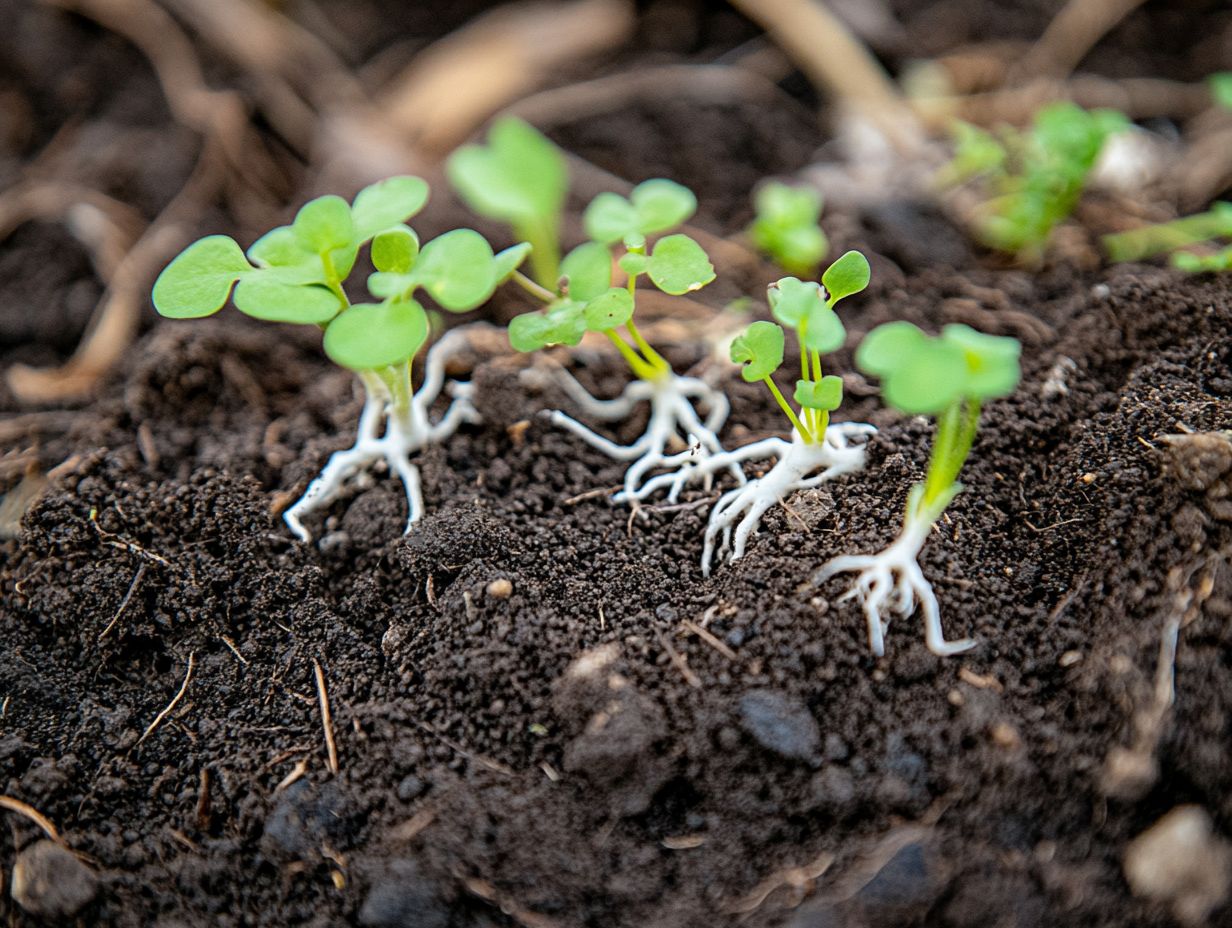
What is the role of mycorrhizae in soil health?
Mycorrhizae are beneficial fungi that form a symbiotic relationship with plant roots. Their main role in soil health is to increase nutrient uptake, improve plant growth, and enhance overall soil quality.
How do mycorrhizae help improve soil health?
Mycorrhizae have specialized structures called hyphae that extend far beyond the reach of plant roots. These structures allow them to access and absorb nutrients such as phosphorus and nitrogen that plants may not reach on their own.
Can mycorrhizae benefit all types of plants?
Yes, mycorrhizae can form symbiotic relationships with a wide variety of plants, including trees, shrubs, flowers, and vegetables. They have been found in nearly 90% of plant species, making them a crucial component of soil health in most ecosystems.
How do mycorrhizae contribute to soil structure?
Mycorrhizae produce a sticky substance called glomalin, which helps bind soil particles together. This creates a more stable and well-structured soil, improving aeration, water retention, and overall soil health.
Are mycorrhizae necessary for healthy soil?
Mycorrhizae are vital for soil health. They help plants access nutrients, which is essential for growth.
Without mycorrhizae, plants may struggle. This can lead to poor growth and a decline in soil quality.
How can I promote the growth of mycorrhizae in my soil?
You can encourage mycorrhizae by reducing synthetic fertilizers and pesticides. Adding organic matter and promoting diverse plant species also helps.
Maintaining proper soil pH and preventing compaction will further benefit mycorrhizal growth.

